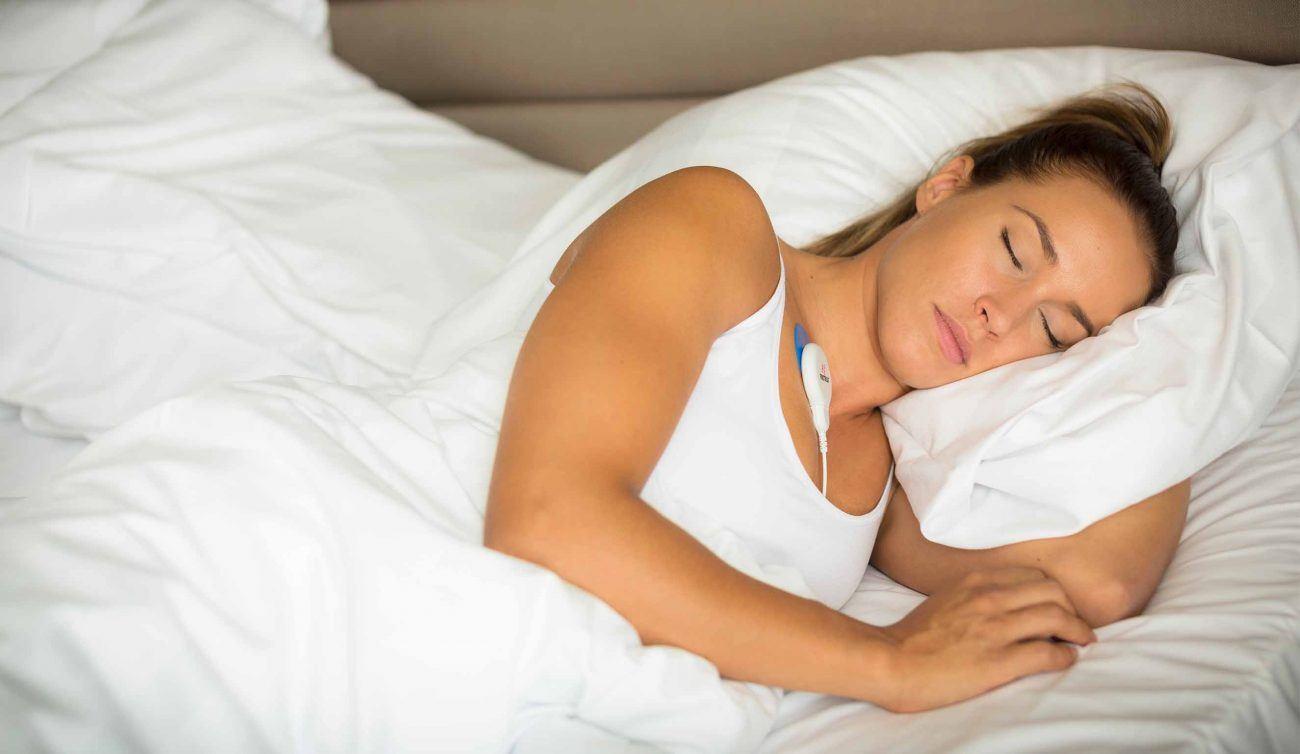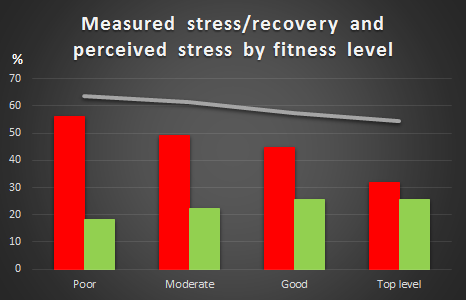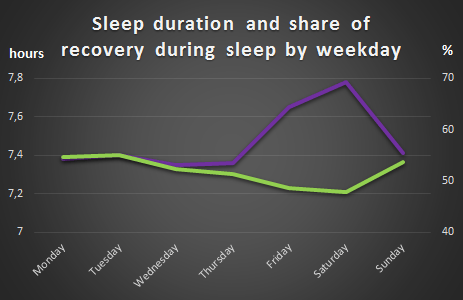
The most efficient night of sleep in the UK in terms of recovery? Tuesday.
A database compiled by Finnish physiological analytics company Firstbeat has a lot to say about activity, sleep, stress and recovery in the UK. Firstbeat, which is currently shortlisted for ukactive’s “Spirit of Innovation Award” at the 2016 Matrix Flame Awards, collected the data in co-operation with Firstbeat UK service provider Optima-life.
The database contains 16,219 days (44.5 years) worth of highly detailed round-the-clock heartbeat recordings captured in real-world conditions during normal everyday activities, allowing the data to comment directly on UK residents’ real activities and their impacts. These recordings were captured as part of Firstbeat Lifestyle Assessments performed by Firstbeat’s UK partner, Optima-life.
Measurements were performed using the Firstbeat Bodyguard2 professional grade heart rate variability monitor which also tracks movement using an internal accelerometer. Data was then analysed by Firstbeat as part of the Firstbeat Lifestyle Assessment service which helps individuals improve performance and personal well-being by providing insight into daily activities and health outcomes.
All told the database contains over 1.3 billion physiological data points all of which are mapped against behaviour; making it likely one of the largest such UK samples ever collected. This includes data from 4866 UK residents (2911 men and 1955 women) which was collected over the past decade. A typical participant contributed monitoring data from three consecutive days of round-the-clock monitoring accompanied by entries in a digital journal for an additional layer of detail.
More Fit, Less Stress, Better Recovery
According to the data, UK residents with higher fitness levels reported lower subjective stress levels, spent a smaller percentage of time in quantifiable stress conditions, and also achieved a higher percentage of recovery, the state of replenishing resources needed to cope with life’s challenges.

This graph illustrates the relationships between UK residents’ fitness level, self-assessed perceived stress, and measured stress and recovery reactions in the body.
The line at the top represents the percentage of UK residents who affirmed the proposition “I generally feel stressed” according to four categories of fitness. The line’s negative slope reveals that participants with higher fitness levels perceive less stress in their daily lives.
The paired bar graph underneath the perceived stress line represents participants’ measured stress and recovery according to fitness level. The red bar represents the portion of time spent in stress states, while the green bar represents the portion of time spent in recovery states. Positive benefits of higher fitness levels are clearly seen in both lower objective stress experienced and higher objective recovery achieved each day.
Getting through the week
Friday (7hrs 39mins) and Saturday (7hrs 46mins) nights offer UK residents the best chance for extended sleep times. Relaxed Sunday morning schedules likely contributor to the Saturday night peak when UK residents averaged a sharp 24 extra minutes of sleep compared to a nights preceding a weekday.

In this graph, the blue line indicates sleep duration measured in hours, while the green line describes the share of recovery occurring during sleep. Tuesday nights top the UK sleep recovery percentage charts at 55.11% and that percentage drops steadily throughout the week before bouncing back to 54.6% on Mondays. More sleep doesn’t necessarily mean more recovery. Friday and Saturday nights are also remarkable in the UK for being the least efficient nights of the week in terms of recovery. On average only 47.9% of sleep time on Saturday night is spent in a recovery state. Friday night offers a slightly higher 48.7%
Alcohol consumption is a likely a contributor to poor recovery levels during Friday and Saturday night’s sleep sessions. This assumption is based on similar findings in an earlier database project in Finland which included 150,000 measurements. While the specific impact of alcohol on recovery varies from person to person, typically consumption of more than 2 portions of alcohol has a demonstrably negative effect on recovery.
UK Women Experience More Stress
Preliminary observations indicate potential benefits of working with women to create a better stress-recovery balance. Women in the UK, on average, spend a higher portion their day (50.3%) in a stress state than men (45.6%), but spend approximately the same portion of the day in a recovery state (women 22.3%; men 23.7%). This is also reflected in participants’ subjective categorization of their experiences. The statement “I generally feel stressed” was affirmed by 63.5% women, but only 57.4% of men.
During the night, UK women on average got slightly more sleep (7hrs 34 mins) per night than men (7hrs 23mins), but men demonstrated greater sleep efficiency in terms of recovery. Time spent in recovery states during sleep varied from 54.5% for men to 48.9% for women. Translated into time this means that despite averaging 13 minutes per night less sleep than women, men still averaged 8 more minutes per night in a recovery state. Subjectively assessed, 60% of women believe that they “sleep enough” compared to 60.8% of men responding to the same statement.
UK men also had a nearly 14% advantage in minutes spent in a recovery state during leisure time with averaging 88 minutes per day while women averaged only 77 minutes per day.
What Next?
These three points are just the tip of the iceberg when it comes to putting the Firstbeat UK database to use. In upcoming months, Firstbeat researchers will continue to examine the data for interesting and informative trends that can be shared to promote awareness of health and well-being issues in the UK. Specific areas to be investigated include occupational stress and physical exertion in the workplace, exercise participation rates and durations, activity impacts, health perceptions, and a host of other relevant topics.
For more information about Firstbeat Lifestyle Assessment in the UK, contact:
Simon Shepard CEO, Optima-life
Tel: +44 (0) 207 135 2424 | Mob: +44 (0)7985 245049
E-mail: simonshepard@optima-life.com
For more information about Firstbeat analytics and their application, contact:
Tero Myllymäki Physiology Research Manager, Firstbeat
Tel: +358 40 749 7595
E-Mail: tero.myllymaki@firstbeat.fi
If you liked this article, you should subscribe to our mailing list